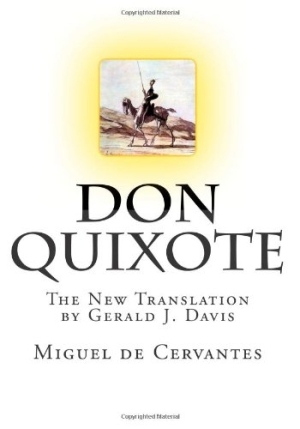Don Quixote
“We would willingly have pardoned the translator if he had not brought Ariosto into Spain and translated him into Castilian, for he has stripped away much of Ariosto’s genius. This is a fault incident to all those who presume to translate books into another language. For, however much care they take and however much ability they employ, they can never equal the original.”
Thus did Miguel de Cervantes caution anyone who takes it upon himself to translate his mighty Don Quixote into another tongue. This warning, delivered by a priest in the novel, has gone unheeded for four centuries. Gerald J. Davis is but the most recent in a long list of translators stretching back to the legendary Thomas Shelton to treat Cervantes’s admonition as a challenge.
Davis does a solid, workmanlike job (the quote above is from Chapter VI of his translation of the great work). His version is eminently readable, and he manages to retain much of the flowery language of the period and author without overdoing it. Davis’s translation does not have the music and timber found in Shelton’s stunningly lyrical original, but then Shelton, as Davis notes, was a contemporary of the author. That classic is to the original Don Quixote what the King James Version is to the Bible.
For those who eschew the “thou mayst,” “quoth I,” and “pray thee” school of literature, however, Davis’s translation is a welcome relief from the Shakespeare-speak of the seventeenth century. Davis does make the book more accessible, but then again so have many translators before him. A quick search on Amazon.com reveals more than one hundred translations of Don Quixote.
Davis contributes nothing new to the lexicon. He offers no notes, special insights, or unique takes on the story, the author, the period, or the legend. Davis does not provide any explanatory footnotes, choosing as an excuse a citation from Noël Coward as to how “having to read a footnote resembles having to go downstairs to answer the door while in the midst of making love.” Davis does not even offer the reader any explanation as to why he felt driven to go where so many have gone before. His author’s note is barely two pages long, and most of that is composed of quotes included in two previous translations.
Davis has done a good job, but he has not given the reader any reason to choose his translation over one of the many others. It is not all that different from the John Ormsby translation of 1885.
Yes, Davis has accomplished his stated goal of making Cervantes “more accessible to the modern reader,” but so have many others. If Davis wants “the modern reader” to choose his version, he needs to make it stand out from the rest, to add something that, as Cervantes wrote so many years ago, will “live on in the memories of mankind.”
Reviewed by
Mark McLaughlin
Disclosure: This article is not an endorsement, but a review. The publisher of this book provided free copies of the book and paid a small fee to have their book reviewed by a professional reviewer. Foreword Reviews and Clarion Reviews make no guarantee that the publisher will receive a positive review. Foreword Magazine, Inc. is disclosing this in accordance with the Federal Trade Commission’s 16 CFR, Part 255.

